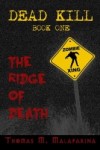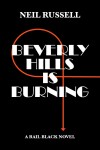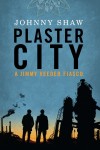

May 19 – 25: “What happens when Hollywood calls?”
 With the Hollywood summer blockbuster season right around the corner, the Big Thrill can’t help but ask: “What happens when Hollywood calls?” This week, ITW Members Johnny Shaw, Ralph Pezzullo, Neil Russell, Thomas M. Malafarina, Rex Burns, Ted Scofield, Lisa Von Biela and Alan Field will answer that call!
With the Hollywood summer blockbuster season right around the corner, the Big Thrill can’t help but ask: “What happens when Hollywood calls?” This week, ITW Members Johnny Shaw, Ralph Pezzullo, Neil Russell, Thomas M. Malafarina, Rex Burns, Ted Scofield, Lisa Von Biela and Alan Field will answer that call!
~~~~~
 Lisa von Biela worked in Information Technology for 25 years, then left the field to attend the University of Minnesota Law School, graduating magna cum laude in 2009. She now practices law in Seattle, Washington. Lisa’s first short story appeared in The Edge in 2002. Her short works have appeared in various small press venues, including Gothic.net, Twilight Times, Dark Animus, AfterburnSF, and more. She is the author of the techno/medical thriller novels THE GENESIS CODE and THE JANUS LEGACY. Her noir/suspense novella, ASH AND BONE, is being released in May 2014, and her BigPharma thriller, BLOCKBUSTER, is scheduled for release in January 2015.
Lisa von Biela worked in Information Technology for 25 years, then left the field to attend the University of Minnesota Law School, graduating magna cum laude in 2009. She now practices law in Seattle, Washington. Lisa’s first short story appeared in The Edge in 2002. Her short works have appeared in various small press venues, including Gothic.net, Twilight Times, Dark Animus, AfterburnSF, and more. She is the author of the techno/medical thriller novels THE GENESIS CODE and THE JANUS LEGACY. Her noir/suspense novella, ASH AND BONE, is being released in May 2014, and her BigPharma thriller, BLOCKBUSTER, is scheduled for release in January 2015.
 Ralph Pezzullo is a New York Times bestselling author, and award-winning playwright and screenwriter. His books have been published in over twenty languages and include JAWBREAKER (with former CIA operative Gary Berntsen), INSIDE SEAL TEAM SIX (with Don Mann), THE WALK-IN, AT THE FALL OF SOMOZA, PLUNGING INTO HAITI (winner of the 2006 Douglas Dillon Prize for American Diplomacy), EVE MISSING, BLOOD OF MY BLOOD, MOST EVIL, and THE NAVY SEAL SURVIVAL HANDBOOK and the SEAL Team Six thrillers HUNT THE WOLF. HUNT THE SCORPION, HUNT THE FALCON, and the forthcoming HUNT THE JACKAL (also with Don Mann).
Ralph Pezzullo is a New York Times bestselling author, and award-winning playwright and screenwriter. His books have been published in over twenty languages and include JAWBREAKER (with former CIA operative Gary Berntsen), INSIDE SEAL TEAM SIX (with Don Mann), THE WALK-IN, AT THE FALL OF SOMOZA, PLUNGING INTO HAITI (winner of the 2006 Douglas Dillon Prize for American Diplomacy), EVE MISSING, BLOOD OF MY BLOOD, MOST EVIL, and THE NAVY SEAL SURVIVAL HANDBOOK and the SEAL Team Six thrillers HUNT THE WOLF. HUNT THE SCORPION, HUNT THE FALCON, and the forthcoming HUNT THE JACKAL (also with Don Mann).
 Ted Scofield is a novelist, non-fiction author, securities attorney and entrepreneur. St. Martin’s released his debut novel, EAT WHAT YOU KILL, on March 25, 2014. Edward R. Pressman, the famed producer of such films as Wall Street, American Psycho and The Crow franchise, has purchased the movie rights. Originally from Louisville, Kentucky, Ted is a three-time graduate of Vanderbilt University. He and his wife, contemporary artist Christi Scofield, live on the Upper East Side of Manhattan.
Ted Scofield is a novelist, non-fiction author, securities attorney and entrepreneur. St. Martin’s released his debut novel, EAT WHAT YOU KILL, on March 25, 2014. Edward R. Pressman, the famed producer of such films as Wall Street, American Psycho and The Crow franchise, has purchased the movie rights. Originally from Louisville, Kentucky, Ted is a three-time graduate of Vanderbilt University. He and his wife, contemporary artist Christi Scofield, live on the Upper East Side of Manhattan.
 Thomas M. Malafarina has published five horror novels, five collections of horror short stories and a book of single panel cartoons; all through Sunbury Press. Thomas’s works have appeared in dozens of short story anthologies and e-magazines. Thomas is known for the twists and surprises in his stories as well as his descriptive often-gory passages. He has been given him the reputation of being one who paints with words.
Thomas M. Malafarina has published five horror novels, five collections of horror short stories and a book of single panel cartoons; all through Sunbury Press. Thomas’s works have appeared in dozens of short story anthologies and e-magazines. Thomas is known for the twists and surprises in his stories as well as his descriptive often-gory passages. He has been given him the reputation of being one who paints with words.
Alan Field, new to the ITW, hopes to make a splash with his first urban thriller, The Chemist, that revolves around a weapon of mass destruction and the person who created it. Alan has written short stories starting from age 10, but this is the first work he wishes to publish. While practicing law for twenty years, Alan fathered four children. He is also an accomplished music composer and arranger who resides in New Jersey.
 Rex Burns, author of numerous books, articles, reviews, and stories, won an Edgar for The Alvarez Journal. The Avenging Angel became a Charles Bronson film. His “Constable Leonard Smith” stories appear in Alfred Hitchcock Magazine. His novels, including the latest, Body Slam, are available from Mysterious Press/ Open Road Media.
Rex Burns, author of numerous books, articles, reviews, and stories, won an Edgar for The Alvarez Journal. The Avenging Angel became a Charles Bronson film. His “Constable Leonard Smith” stories appear in Alfred Hitchcock Magazine. His novels, including the latest, Body Slam, are available from Mysterious Press/ Open Road Media.
 Neil Russell is founder and president of Site 85 Productions, an entertainment-focused intellectual property rights company based in Beverly Hills. He is a former senior executive with Paramount, Columbia, MGM, United Artists and Carolco—the company that produced the Rambo movies, Terminator 2, Total Recall and Basic Instinct. Site 85 has entered into rights agreements with numerous companies, including Jerry Bruckheimer Films, Columbia, Disney, Universal, Warners, Fox, ABC, NBC, CBS, F/X, Activision and many others.
Neil Russell is founder and president of Site 85 Productions, an entertainment-focused intellectual property rights company based in Beverly Hills. He is a former senior executive with Paramount, Columbia, MGM, United Artists and Carolco—the company that produced the Rambo movies, Terminator 2, Total Recall and Basic Instinct. Site 85 has entered into rights agreements with numerous companies, including Jerry Bruckheimer Films, Columbia, Disney, Universal, Warners, Fox, ABC, NBC, CBS, F/X, Activision and many others.
 Johnny Shaw was born and raised on the Calexico/Mexicali border, the setting for his novels DOVE SEASON, BIG MARIA, and the upcoming PLASTER CITY. He has won both the Spotted Owl Award and the Anthony Award. His shorter work has appeared in Plots With Guns, Thuglit, Shotgun Honey, Crime Factory, and numerous anthologies. Johnny also acts as the editor-in-chief and is a frequent contributor for the online fiction quarterly BLOOD & TACOS, a loving homage to the men’s adventure paperbacks of the 1970′s & 1980′s. Johnny received his MFA in Screenwriting from UCLA and over the course of his writing career has seen his screenplays optioned, sold and produced. As a playwright, his stage collaborations with actor Jaime Arze, NATURAL ACTS and A GOOD KIND OF CRAZY, have been performed throughout Los Angeles. For the last dozen years, Johnny has taught screenwriting. He has lectured at both Santa Barbara City College and UC Santa Barbara. He is the owner of Johnny’s Used Books, formerly a brick-and-mortar bookstore in Los Angeles, now entirely online.
Johnny Shaw was born and raised on the Calexico/Mexicali border, the setting for his novels DOVE SEASON, BIG MARIA, and the upcoming PLASTER CITY. He has won both the Spotted Owl Award and the Anthony Award. His shorter work has appeared in Plots With Guns, Thuglit, Shotgun Honey, Crime Factory, and numerous anthologies. Johnny also acts as the editor-in-chief and is a frequent contributor for the online fiction quarterly BLOOD & TACOS, a loving homage to the men’s adventure paperbacks of the 1970′s & 1980′s. Johnny received his MFA in Screenwriting from UCLA and over the course of his writing career has seen his screenplays optioned, sold and produced. As a playwright, his stage collaborations with actor Jaime Arze, NATURAL ACTS and A GOOD KIND OF CRAZY, have been performed throughout Los Angeles. For the last dozen years, Johnny has taught screenwriting. He has lectured at both Santa Barbara City College and UC Santa Barbara. He is the owner of Johnny’s Used Books, formerly a brick-and-mortar bookstore in Los Angeles, now entirely online.
- LAST GIRL MISSING with K.L. Murphy - July 25, 2024
- CHILD OF DUST with Yigal Zur - July 25, 2024
- THE RAVENWOOD CONSPIRACY with Michael Siverling - July 19, 2024
